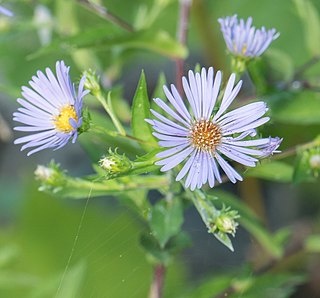
Ionactis, common name stiff-leaved asters or ankle-asters, is a small genus of plants belonging to the family Asteraceae. These aster-like plants are endemic to North America. One species is widespread across much of the eastern half of the continent, while two others are rare endemics with very restricted ranges.

Symphyotrichum puniceum, is a species of flowering plant in the family Asteraceae native to eastern North America. It is commonly known as purplestem aster, red-stalk aster, red-stemmed aster, red-stem aster, and swamp aster. It also has been called early purple aster, cocash, swanweed, and meadow scabish.

Aster alpinus, the alpine aster or blue alpine daisy, is a species of flowering plant in the family Asteraceae, native to the mountains of Europe, with a subspecies native to Canada and the United States. This herbaceous perennial has purple, pink, white or blue flowers in summer.

Ionactis linariifolia also known as the flax-leaf ankle-aster, flaxleaf whitetop or simply aster is a North American species of plants in the family Asteraceae.

Symphyotrichum sericeum is a species of flowering plant in the family Asteraceae native to central North America. Commonly known as western silver aster, western silvery aster, and silky aster, it is a perennial, herbaceous plant that may reach 70 centimeters tall. Its flowers have purple ray florets and pink then purple disk florets, and its leaves are firm and silvery-green.

Symphyotrichum ascendens is a species of flowering plant in the family Asteraceae known by the common names western aster, long-leaved aster, and Rocky Mountain aster. Blooming July–September, it is native to western North America and can be found at elevations of 500–3,200 m (1,600–10,500 ft) in several habitats.

Symphyotrichum defoliatum is a species of flowering plant in the family Asteraceae known by the common name San Bernardino aster. It is endemic to Southern California where it grows in grasslands and meadows, and it is of conservation concern.

Symphyotrichum eatonii is a species of aster known by the common name Eaton's aster. It is native to much of western North America from British Columbia to Saskatchewan, the Sierra Nevada in California, the Rocky Mountains region, to Arizona and New Mexico, where it grows in many habitats, especially wet areas such as meadows and near ditches.

Symphyotrichum greatae is a species of flowering plant in the family Asteraceae endemic to California and known by the common name Greata's aster.

Symphyotrichum lentum is a species of flowering plant in the family Asteraceae with the common name of Suisun Marsh aster. It is a perennial and herbaceous plant endemic to the marshes of Sacramento-San Joaquin River Delta of Northern California.

Chaenactis suffrutescens is a species of flowering plant in the aster family known by the common name Shasta chaenactis.

Symphyotrichum prenanthoides is a species of flowering plant in the family Asteraceae known by the common name crookedstem aster. It is native to northcentral and northeastern North America.
Eucephalus glabratus is a North American species of flowering plant in the family Asteraceae with the common names of smooth aster, smooth wayside-aster, and Siskiyou aster. It is a perennial herb up to 60 centimeters tall, with branching rhizomes. Stems and leaves are hairless or nearly so. One plant will usually produce 3–8 flower heads per stem. Each head has 0–4 violet ray florets surrounding numerous yellow disc florets.
Ionactis elegans, the Sierra Blanca least-daisy, is a rare North American species in the family Asteraceae. It has been found only in New Mexico in the western United States.
Ionactis stenomeres, the Rocky Mountain aster, is a rare North American species in the family Asteraceae. It in the Province of British Columbia in western Canada and also in the northwestern United States.

Symphyotrichum jessicae is a species of flowering plant in the family Asteraceae endemic to Idaho and Washington states in the United States. Commonly known as Jessica's aster, it is a perennial, herbaceous plant that may reach 40 to 150 centimeters tall. Its flowers have violet ray florets and yellow disk florets. It is of conservation concern and known only from the Palouse River and Clearwater River drainages of eastern Washington and northwestern Idaho.

Symphyotrichum porteri is a species of flowering plant in the family Asteraceae endemic to the foothills of the Rocky Mountains in the U.S. states of Wyoming, Colorado, and New Mexico. Commonly known as Porter's aster, it is a perennial, herbaceous plant that may reach 10 to 50 centimeters tall. Its flowers have white, rarely pinkish, ray florets and yellow, becoming pink then brown, disk florets. S. porteri grows at elevations of 1,800–2,900 meters. Its limited range makes it a NatureServe Vulnerable (G3) species, and it is classified Critically Imperiled (S1) in Wyoming.

Symphyotrichum retroflexum is a species of flowering plant in the family Asteraceae native to the southeastern United States. Commonly known as rigid whitetop aster, it is a perennial, herbaceous plant that may reach 40 to 100 centimeters tall. Its flowers have blue to purple ray florets and cream to pale yellow then pinkish disk florets. It is known only from the Blue Ridge Mountains in Alabama, Georgia, North Carolina, South Carolina, Tennessee, and Virginia, where it grows in wooded areas at elevations of 400–1,500 meters. As of September 2021, NatureServe classified it as Apparently Secure (G4); it had been reviewed last in 1994 and is marked as "needs review". There is an introduced presence of S. retroflexum in southeast China.

Symphyotrichum eulae is a species of flowering plant in the family Asteraceae endemic to Texas. Commonly known as Eula's aster, it is a perennial, herbaceous plant that may reach 5 to 150 centimeters in height. Its flowers have usually white to bluish or lavender-white ray florets and yellow then reddish to brown disk florets. It was named for Eula Whitehouse, American botanist, botanical illustrator, and plant collector.

















